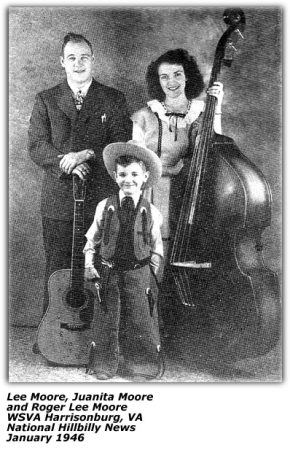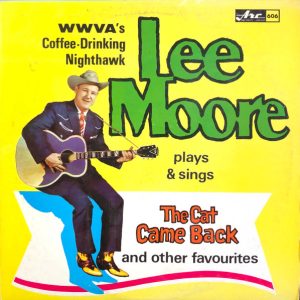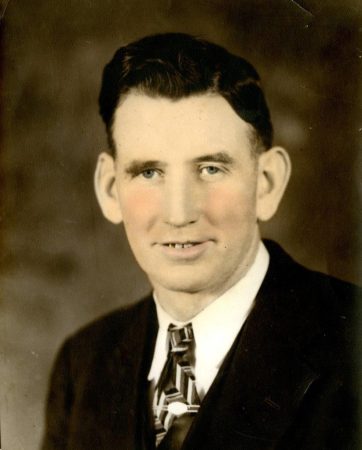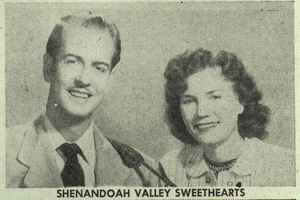In de vorige post ging de laatste vraag over Lee Moore (‘The coffee drinkin’ nighthawk’). Het antwoord op die vraag was dusdanig lang dat we destijds (in 2004) besloten ergens halverwege het antwoord een knip te maken. Bill Clifton begint zijn verhaal in deze twaalfde post in deze serie dan ook met Lee Moore en z’n eerste vrouw Juanita. Mocht u trouwens denken dat er een andere foto bovenaan deze post staat… Dat klopt. De gehele serie staat op 4 CD’s. Ik had bedacht om met een volgende CD ook maar een andere foto bovenaan de post te zetten. Net als de voorgaande ‘kopfoto’ is ook de nieuwe ‘kopfoto’ gemaakt op de Carter Family Conference in Londen (in 2002).
Highlights & Meeting A.P. Carter
Transcriptie:
A t the time I wasn’t aware of all the work that he and his first wife, Juanita, had done and who they’d worked with. If I’d known that they’d worked with Roy Hall and people like that I would have asked him a lot of questions and gotten into his mind a bit and had some information I don’t have now. But by the time I was in music and playing around near Roanoke, where Roy Hall was living or had lived and died, I was too late. Roy Hall had died already and had been dead for a number of years. His widow was still living and I used to communicate with her. She sent me all of Roy Hall’s old songs and anything she had in the closet and that nobody else had asked for. Unfortunately I have a lot of good things that I have never put in a place where they should be. And I’m sometimes not able to find them anymore. When we had that big flood we lost a lot of things. A lot of personal letters from people that I had saved over the years were in the bar. And they got flooded out. Lost completely. Everything was covered in mud and I just said: ‘well, throw it in the dumpster. There’s just no point in trying to sort it out’. I had a lot of letters from Woody Guthrie. One letter in particular I’ve been wanting to show that to people for years and I never have found it. For a long time I
t the time I wasn’t aware of all the work that he and his first wife, Juanita, had done and who they’d worked with. If I’d known that they’d worked with Roy Hall and people like that I would have asked him a lot of questions and gotten into his mind a bit and had some information I don’t have now. But by the time I was in music and playing around near Roanoke, where Roy Hall was living or had lived and died, I was too late. Roy Hall had died already and had been dead for a number of years. His widow was still living and I used to communicate with her. She sent me all of Roy Hall’s old songs and anything she had in the closet and that nobody else had asked for. Unfortunately I have a lot of good things that I have never put in a place where they should be. And I’m sometimes not able to find them anymore. When we had that big flood we lost a lot of things. A lot of personal letters from people that I had saved over the years were in the bar. And they got flooded out. Lost completely. Everything was covered in mud and I just said: ‘well, throw it in the dumpster. There’s just no point in trying to sort it out’. I had a lot of letters from Woody Guthrie. One letter in particular I’ve been wanting to show that to people for years and I never have found it. For a long time I  know I have shown it to a lot of people. Maybe I let somebody take it home with him one time that I don’t remember. Woody wrote to me on anything he could find to write on. He would always write on a typewriter. But whatever paper was there was what he used. And he wrote me a very long letter on happy Chanukah paper. Well, you know, it’s got decorations all over it. You try to read these words and it’s got all these decorations and you try to see what it is. And it was a typical Guthrie letter. It was about why I should not join the United States Marine Corps. And why I should be a merchant seaman like he was, you know.
know I have shown it to a lot of people. Maybe I let somebody take it home with him one time that I don’t remember. Woody wrote to me on anything he could find to write on. He would always write on a typewriter. But whatever paper was there was what he used. And he wrote me a very long letter on happy Chanukah paper. Well, you know, it’s got decorations all over it. You try to read these words and it’s got all these decorations and you try to see what it is. And it was a typical Guthrie letter. It was about why I should not join the United States Marine Corps. And why I should be a merchant seaman like he was, you know.
He thought you were in need of that advice? Yeah, he always advised me, whether I asked for it or not. Woody was the one who would give you the advice you know. A.P. did it in a different way. A.P. Carter would always give me advice but always in a very gentle way. Or in a way that was kind of around this way (makes big circle with his hands). You could take it as advice or you could leave it. But Woody always gave it to you straight on, you know. ‘This is the way you got to do your life’.

We talked about your highlights and you talked about your first recordings… Well, I guess even before that. I guess my first radio program was a highlight also. Meeting A.P. Carter and getting to know him was certainly a major highlight.
How did that come about? Well, it came about in a very interesting way. When I first started listening to the music and buying records I was a teenager. And I was living in Baltimore County in Maryland, which was not exactly a hotbed of interest in traditional mountain music. But there was one local record shop that was run by two people, a husband and wife team, both from western North Carolina. And they knew a lot about the music, coming from western North Carolina. So I would go in and I would talk to them about what records they could get. Well, they could get quite a few records that I was interested in and they always did get them. And I would go in and buy these records. After a certain period of time I said to them: ‘You know, there’s hasn’t been a new record by The Carter Family for a long time. Can you find out why we’re not getting the new records by The Carter Family?’ And he said: ‘Well, I’ll ask the RCA man when he comes in’. He said: ‘I don’t know either why I’m not getting them but you’re right. We’re not getting any new Carter Family records’. This was in the period about 1946, I would say or ’47 maybe, when I asked him this. A couple of months later I was in there and I asked him. ‘Felix, did you ask the RCA man about The Carter Family?’ ‘Yeah, I asked him and he said the old man died’, I think it was. So I thought: ‘I’ll never get to meet him’. Well, in 1949 I was at the University of Virginia as a first-year student and I had a radio. When I wasn’t in class I was listening to the radio to pick up what I could find. Whatever anybody was playing for good music in the area. And one of the stations I could pick up was Farmville, WFLO in Farmville, Virginia. And Bill and Mary Reid (The Shenandoah Valley Sweethearts), who you may never have heard of…
Yeah… Yeah, know them?
 I have their CD on Old Homestead. Well, Bill and Mary were doing a program and at that time Curly Lambert was their mandolin player. Who later played with me and with Flatt & Scruggs and The Stanley Brothers and with various other people. Curly was a superb mandolin player. When he was working with Bill and Mary he played beautiful mandolin. So every day around noon I would listen. I wasn’t in class so I would listen to that program. Or maybe it was one o’clock in the afternoon. But anyhow it was a time when I wasn’t in class. So I turned this radio on, it was in November of 1949. When they came on the radio Bill Reid said: ‘Don’t even think about touching that dial. Friends, you’re not gonna believe who we got in the studio. And we’re gonna get him up here in just a little while’. And I thought: ‘Well, maybe somebody from Nashville or somebody that dropped in. An important person. I wonder who it is?’ Well, when the introduction came, I can hardly tell this story without getting choked up, when the introduction came it was so directed that this gentleman is a member of a trio with his wife and his sister-in-law. And I thought: ‘It can’t be!’ And they introduced him and he sang ‘Storms are on the ocean’. And I just thought: ‘I got to get down to Maces Springs!’ I knew where they lived I just… ‘I got to get down to Maces Springs and meet him!’ During the radio program, by the way, the other thing was: Bill and Mary went back on to sing another song after A.P. sang ‘Storms are on the ocean’. And, being in the month of November, of course it was cold out. Suddenly, in the middle of the song that Bill and Mary were doing I heard Bill saying: ‘Now, don’t be taking your overcoat over there, don’t be getting your overcoat off the piano, we’re gonna get you back up here Mr. Carter to sing another song. And so I pictured this man…’.
I have their CD on Old Homestead. Well, Bill and Mary were doing a program and at that time Curly Lambert was their mandolin player. Who later played with me and with Flatt & Scruggs and The Stanley Brothers and with various other people. Curly was a superb mandolin player. When he was working with Bill and Mary he played beautiful mandolin. So every day around noon I would listen. I wasn’t in class so I would listen to that program. Or maybe it was one o’clock in the afternoon. But anyhow it was a time when I wasn’t in class. So I turned this radio on, it was in November of 1949. When they came on the radio Bill Reid said: ‘Don’t even think about touching that dial. Friends, you’re not gonna believe who we got in the studio. And we’re gonna get him up here in just a little while’. And I thought: ‘Well, maybe somebody from Nashville or somebody that dropped in. An important person. I wonder who it is?’ Well, when the introduction came, I can hardly tell this story without getting choked up, when the introduction came it was so directed that this gentleman is a member of a trio with his wife and his sister-in-law. And I thought: ‘It can’t be!’ And they introduced him and he sang ‘Storms are on the ocean’. And I just thought: ‘I got to get down to Maces Springs!’ I knew where they lived I just… ‘I got to get down to Maces Springs and meet him!’ During the radio program, by the way, the other thing was: Bill and Mary went back on to sing another song after A.P. sang ‘Storms are on the ocean’. And, being in the month of November, of course it was cold out. Suddenly, in the middle of the song that Bill and Mary were doing I heard Bill saying: ‘Now, don’t be taking your overcoat over there, don’t be getting your overcoat off the piano, we’re gonna get you back up here Mr. Carter to sing another song. And so I pictured this man…’.
Noot Harry Vogel: Ik had bedacht dat ik ‘The storms are on the ocean’ van The Carter Family hier bij deze post zou plakken. De bovenste versie is de versie van The Bristol Sessions (1 augustus 1927). De versie hieronder werd opgenomen voor RCA in 1935. Ik was verbaasd over het verschil tussen de beide opnamen en besloot ze allebei maar te plaatsen. Ik vind ze beiden prachtig! Hope you like it…
Wandering off again… Wandering off again. ‘Just grab my overcoat. Did my thing so I’ll grab my overcoat and go again’. So in the spring I worked it out with my rural sociology professor who gave us a paper to do. He said: ‘you can do it on any county that you want to do’. He said: ‘This is going to be an important paper for your term work. You can pick your own county and we’re going to need to have certain data on this county. And you’re going to have to collect this data from that county’. So I said; ‘Oh, I’ll take Scott County’.

Dat verhoal over Bill en Mary Reid en A.P. Carter is altied bliem rondsoezen in mien kop. Dat zol een ontdekken west wezen dat A.P. nog steeds ‘around’ was. Volgens mie het A.P. ‘The storms are on the ocean’ ook loater nog weer opnomen mit Janette, Joe en Sara en eventueel met The Phipps Family. Zuik moar eem oet. En natuurlijk is zien contact met Woody ook apaart. Het bewiest moar eem weer hou belangriek het is dat je een vrauw hebben dei alles veur joe archiveerd. Zodat nait een overstromen het volledig nait noar de gallemiezen helpt. Moar het kin ook een vingerwiezen wezen van Boven dat ‘Alles van waarde hoe schoon ook eens zal vergaan’ (‘Grijp toch de kansen’) oet de olle Baptistenbundel. Zeg het moar eem weer Harry!
Volgens mij zong Jeanette Carter het destijds ook in Londen op ‘The Carter Family Conference’ waar Kees en ik destijds geweest zijn. Ik weet nog dat ik met netjes aan haar voorstelde en haar een hand gaf. Dichterbij de ‘Original Carter Family’ ben ik nooit eerder geweest (en ’t zal ook niet meer gebeuren)…
Luusterst doe ook voicemailberichten ook oaf?
Vrijwel altijd. Soms duurt het iets langer dan gebruikelijk als ik me een paar dagen wat minder goed voel…